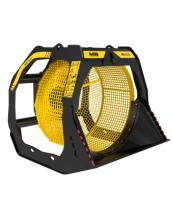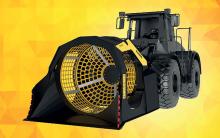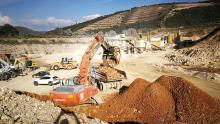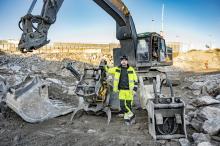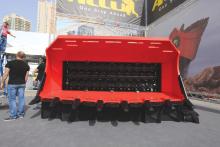An MB attachment is helping to facilitate a complicated renovation scheme in the German city of Munich. Liam McLoughlin reports.
An
The project is to carry out excavations and construct a building extension in the courtyard of a house at 45 Franziskaner Strasse. The property is at the centre of a network of underground tunnels, some dating as far back as 1700.
The tunnels are underneath modern buildings, houses and shops, with the owners of many of these looking to expand to accommodate new tenants or businesses. The crowded surrounding streets mean there is generally little potential space for development, and MB says the courtyard was the only available choice for the construction scheme.
German company Stöger Baggebetrieb, which is carrying out the project, began to construct the building extension by demolishing part of the inner courtyard and then laying new foundations. Demolition waste from the site is being used to fill the foundations of the new building.
Stöger Baggebetrieb installed the crusher bucket from Italy-based manufacturer MB on the Cat 305 5E2 excavator that is being used to work inside the yard. The bucket is operated directly from the cab of the excavator, which manoeuvres in a very small space as the crusher bucket collects the material and reduces it on the same spot. MB says that processing the material on the site means there are zero transport costs and hassle-free operations. The required output size can be adjusted by the operator on-site in a few minutes without the need to call in a specialised workshop.
MB says the biggest challenge was to safely manage the construction site, in a short time and without disturbing the neighbourhood. The project faced a number of difficulties: moving the compact equipment through the narrow courtyard entrance; limiting the amount of dust, noise and vibrations produced; managing the excavated material; and working rapidly while containing costs.
At number 45 the courtyard entrance is narrow and the inner yard itself is small. The only equipment capable of fitting without problems to carry out the excavations was a 5-tonne mini-excavator. In addition, there was the issue of what to do with the material once it had been excavated. At first glance the solution seemed to be to load it onto small lorries and haul it to recycling centres, and then bring back the stabilised material into the yard to fill the foundation base.
MB says this would have been a logistical nightmare in terms of coordinating the number of lorries coming in and out of the site. There would have been timing issues, unforeseen costs, downtime and limits on the operation of trucks in the city centre.
The MB-C50 crusher bucket provided a solution to these issues as there are no haulage costs, and it arrives on-site already installed on the digger.
Vibrations from the construction could have compromised the building structure. To combat this the MB-C50 crusher bucket is equipped with a dust nebuliser, designed for reduced noise compared to traditional means of crushing, fewer vibrations to the arm and zero to buildings.
MB displayed its 12-strong range of crusher buckets at the bauma China trade show in Shanghai in November. Visitors had the opportunity to see the BF120.4 bucket that is suitable for excavators from 30 tonnes; the BF90.3 for excavators from 21 tonnes; the MB-L200, suitable for loaders, backhoes and skidsteers; the MB-S18 screening bucket; and the MB-R800 drum cutter.
The company says that one of its customers in Indonesia has installed an MB-S23 screening bucket on a Komatsu excavator to clean the alluvial rocks from sand, mud and clay. Once cleaned, the screened material is crushed and used for road maintenance work.
Mounted on a Cat 3360 excavator, the MB crusher bucket BF120.4 has been used in China to crush rocks that are reused for road construction.
MB says that use of its bucket products has helped to reduce problems with delays to road construction projects in a number of developing countries. In Malaysia, for example, new schemes are underway to add to the approximately 65,000 km of roads that connect to every state. The process of construction of a new road – whether from asphalt or concrete – requires the production of an excellently bonded pavement structure, beginning with a stable base layer and going all the way to a precisely levelled surface course.
Although a fairly straightforward process, construction can often be delayed at this stage. Studies have been conducted in Malaysia to identify the problems faced by contractors and the reasons for the many requests for extension of road construction times. These have pinpointed the following challenges: lack of materials, lack of workers, change of design, financial problems and lack of machinery.
MB says these issues were recently improved for contractors in the Sibu district of the country with the use of an MB Crusher Bucket BF90.3 mounted on a Hyundai 210 LC-7, which it says makes excavators easy to manoeuvre and transport around.
Finnish recycling company Remeo has invested in a D series attachment from the Allu range of Transformers. Remeo says the processing power of the Transformer has proven to be particularly effective in dealing with demolition waste and recycling asphalt.
The Allu Transformer series comprises an excavator/loader/tractor-mounted processing bucket which screens, pulverises, aerates, blends, mixes, separates, crushes, feeds and loads materials. This is designed to result in the feed material being effectively transformed into highly valuable products, with the intention of making businesses more efficient and profitable.
Remeo employs around 350 people and utilises a specialist fleet of over 200 recycling equipment vehicles. With offices located throughout Finland, including Vantaa, Riihimäki, Tampere, Heinola, Lahti, Kotka, Turku, Vaasa, Uusikaupunki, Lappeenranta, Seinäjoki, Vihanta, and Ylivieska, the company’s collection network channels waste for recycling to its nine recycling stations. Here materials are recycled and treated in plants before being delivered for appropriate further processing, or for processing as an industrial raw material.
Remeo says the Allu attachment has enabled it to utilise its existing fleet of excavators and loaders to deal with materials either on site, in the case of demolition waste and road planings, or load screened material directly onto its haulage fleet. The processing power of the Allu Transformer is claimed to reduce weight by up to 50% (by screening out valuable materials prior to hauling), which increases the efficiency of its operation, as well as reducing emissions from its haulage fleet.
Catering for applications of all sizes, and capable of processing any material that can be screened and sorted, the Allu Transformer series comprises the compact DL & D Series as well as the massive M and G Series. All are designed to improve efficiency and profitability for material handling and processing businesses.
Allu exhibited some of the Transformers range at bauma China in November. The models on show were the DH 3-23 X75 drums, the DS 3-23 (with TS 25 mm standard blades for screening), and the DS 3-12 with 60mm drums.
Italy-based screening bucket manufacturer Simex has started construction work on a new 7,000 m2 production facility at its base in San Giovanni. Once the new unit is operational later this year, Simex CEO Mirco Risi says it will enable the company to organise and manage different processes more efficiently, with improvements extending to its delivery capacities.
Simex supplies a range of screening buckets with an adjustable output size. The VSE screening buckets for excavator mounting feature hydraulic adjustment of drum distance to allow the size of the screened material to be varied in seconds.
Drums are composed of elements with different diameter disks, whose varying peripheral speed generates intense spinning of the material to be screened, which is designed to result in higher output.
The VSE is shaped as a standard bucket, which Simex says facilitates and simplifies loading of material. There are four variants in the range: the VSE 10 (bucket capacity 0.40 m3, recommended excavator weight 8-13 tonnes); the VSE 20 (bucket capacity 0.70 m3, recommended excavator weight 12-18 tonnes; the VSE 30 (bucket capacity 1.00 m3, recommended excavator weight 16-30 tonnes); and the VSE 40 (bucket capacity 1.80 m3, recommended excavator weight 30-45 tonnes).

